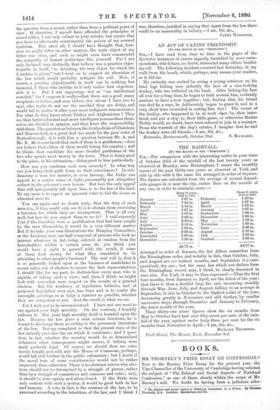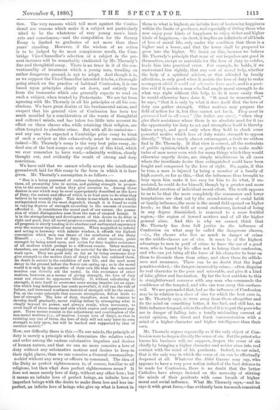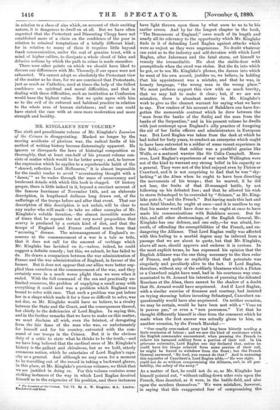BOOKS.
MR. THORNELY'S PRIZE ESSAY ON CONFESSION.* This is the Burney Prize Essay for the present year, the Vice-Chancellor of the University of Cambridge having selected. the subject of " The Ethical and Social Aspects of Habitual Confession," as one of those clearly within the scope of Mr. Burney's will. We doubt its having been a judicious selec- • The Ethical and &dal Aspect of Habitual Confession to a Priest. By Thomas Thom*, B.A. London : Macmillan and Co.
tion. The very reasons which tell most against the Confes- sional are reasons which make it a subject not particularly sited to be the whetstone of very young men's intel- ects and consciences,—and the competition for the Burney Essay is limited to graduates of not more than three years' standing. However, if the wisdom of an action is to be judged by its most conspicuous result, the Cam- bridge Vice-Chancellor's selection of a subject in the pre- sent instance will be remarkably vindicated by Mr. Thoruely's fine and thoughtful essay. There is no trace in it of the con- ventionality of treatment which a young man, treading on rather dangerous ground, is apt to adopt. And though it is, as we suppose the Vice-Chancellor intended it to be, a thorough- going attack on the practice of habitual Confession, it is one based upon principles clearly set down, and entirely free from the buncombe which one generally expects to read on such a subject, when treated by Protestants. We are far from agreeing with Mr. Thornely in all his principles or all his con- clusions. We have great doubts of his fundamental axiom, and -suspect that his general view of Confession has been too much moulded by a consideration of the wants of thoughtful and cultured minds, and has taken too little into account its effect on those classes who, while retaining their religion, are often tempted to absolute crime. But with all its omissions— and any one who expected a Cambridge prize essay to treat of such a subject as this exhaustively must be unreasonable indeed—Mr. Thornely's essay is the very best prize essay, in- deed one of the best essays on any subject of this kind, which we ever remember to have read,—admirably written, clearly thought out, and evidently the result of strong and deep conviction.
We have said that we cannot wholly accept the intellectual groundwork laid for this essay in the form in which it is here given. Mr. Thornely's assumption is as follows :-
" Man is a being possessed of various impulses, desires, and affec- tions, all prompting him to action, and gaining strength in propor- tion to the amount of action they give occasion to. Among these desires is one which may be most appropriately described as the Love of Duty, the nature and office of which is to lead men to do what they believe to be morally right. This desire is one which is never wholly extinguished even in the most degraded, though it is found to exist in varying degrees of strength according to the amount of exercise afforded it. It constitutes the moral part of our nature, the posses- sion of which distinguishes man from the rest of created beings. It is in the strengthening and development of this desire to do what is right and good, that all moral progress consists, and the end to which all progress is slowly tending is its absolute and undisputed supremacy over the meaner impulses of our nature. When magnified to infinity and acting in harmony with infinite wisdom, it affords the highest conception which men can frame of the attributes of the 'Deity
Himself The love of duty, like all other motives, gains strength by being acted upon, and action for duty implies resistance of all motives which prompt to a different course. Other motives, therefore, are useful as supplying the material for the love of duty to work upon. They are good only so far as by being overcome they give strength to the motive (love of duty) which has subdued them. As death in nature is the condition of new life, and the seed must decay in the ground before the flower can spring up ; so in the moral world it is only by the sacrifice of their own life that the non-moral motives can directly aid the moral. In this resistance of other motives, however, as a means of giving strength, the love of duty must not choose its opponents blindly. If, without calculating its strength, it sets itself to overcome some strong impulse (as an appe- tite which long indulgence has made powerful), it will run the risk of failure, and increased weakness instead of strength will be the result. For, on the same principle that success strengthens, defeat leads to loss of strength. The love of duty, therefore, must be content to develop itself gradually, never risking defeat by attempting what is clearly beyond its power, and always ready, when necessary, to avail itself of those means and aids which reason and experience sug- gest. These means consist in the adjustment and combination of the non-moral motives (i.e,, all motives except love of duty), so that in resisting any one of them, the love of duty will not only have its own strength to rely upon, but will be backed and supported by that of another motive."
Now, our difficulty there is this :—To our minds, the principle of duty is merely a principle which determines the relative value and order among the various substantive impulses and desires of human nature, and that we can no more conceive a love of duty without any substantive motives and desires to keep in their right places, than we can conceive a General commanding- n-chief without any army or officers to command. The idea of the Deity as perfect righteousness is, of course, familiar to all religions, but then what does perfect righteousness mean P It does not mean merely love of duty, without any other love ; but it means an infinite love of perfect beings, an infinite love of imperfect beings with the desire to make them less and less im- perfect, an infinite love of beings who give up what is lowest in
them to what is highest, an infinite love of bestowiug happiness within the limits of goodness, and especially of fitting those who now enjoy poor kinds of happiness to enjoy richer and higher kinds of happiuess,—in short, it implies an infinitude of all kinds of love of moral life, only under the condition that there is a higher and a lower, and that the lower shall be prepared to grow into the higher. We insist on this, because we believe Mr. Thornely's principle that none of our impulses are good in themselves, except as materials for the love of duty to subdue, leads him into practical error. For example, he holds, if we understand him rightly, that any sort of moral help, whether the help of a spiritual adviser, or that afforded by family affections, is only good when it assists the love of duty to make a conquest which it could not otherwise have made, and is a posi- tive evil if it assists a man who had ample moral strength to do what was right without this help, to do it more easily than he would otherwise have done it. "It must be remembered," he says, " that it is only by what it does itself that the love of duty can gather strength. Other motives may prepare the field of action for it, but they cannot act for it. They must be presu»zed bad in all cases" [the italics are ours], " when they give their assistance where there is no absolute need for it (as the opportunity for duty to act and strengthen itself is thereby taken away), and good only when they hold in check some powerful motive which love of duty wants strength to oppose directly." That is surely almost extravagant, a fault we seldom find in Mr. Thornely. If that view is correct, all the restraints of public opinion,-which act so powerfully as to make multi- tudes of men never even wish for many things which they would otherwise eagerly desire, are simply mischievous in all cases where the inordinate desire thus extinguished could have been fought and conquered by the love of right. So, again, if this be true, a man is injured by being a member of a family of high morale, so far as this,—that the influences thus brought to bear upon him make it too easy for him to do what, if un- assisted, he could do for himself, though by a greater and more healthful exertion of individual moral effort. The truth appears to us to be that the more completely the commoner and lower temptations are shut out by the second-nature of social habit or family influence, the more is the moral field opened on higher levels ; so that the field of moral endeavour, instead of being in any degree diminished, is removed to a more fruitful region,—the region of inward motives and of all the higher general aims. And this is why we cannot think that Mr. Thornely has done full justice to the influence of Confession on what may be called the dangerous classes, —i.e., the classes who live as much in danger of crime as the middle-classes are of vice. It must be of the highest
advantage to men in peril of crime to have the car of a good man, who is bound by his office not to betray their confession, and who can yet bring all the force of his character to bear on them to dissuade them from crime, and show them its selfish- ness and meanness. There can be no doubt that the legal penalties risked,—the dangers incurred by crime,—often disguise its real character to the poor and miserable, and give it a kind of false glitter and fascination. By far the best antidote to this is straightforward converse with any man who commands the confidence of the tempted, and who can tear away this surface- veil. We are persuaded that, bad as the influence of Confession may be in relation to a class of sins for which the best cure is, as Mr. Thornely says, to turn away from them altogether and fix the mind on something better, it has had, and still has, no little influence for good, where the effect of it is to put the poor who are in danger of falling into a totally misleading current of social opinion, into direct and frank communication with a mind of a higher character and higher intelligence than their own.
Mr. Thornely argues repeatedly as if the only object of Con- fession were to deepen directly the sense of sin. But the priest who
knows his business will, we suppose, deepen the sense of sin chiefly by bringing a higher character and nobler aims into real contact with the mind of his penitents. Indeed, to our mind, that is the only way in which the sense of sin can be effectually deepened at all. Whatever the Abb6 Ganme may say, who appears to have a very poor notion indeed of the best defence to be made for Confession, there is no doubt that the better Catholics have always insisted on the necessity of stirring the minds of their penitents with some breath of higher moral and social influence. What Mr. Thornely says,—and he says it with great force,—has evidently been too much conceived. in relation to a class of sins which, on account of their exciting nature, it is dangerous to dwell on at all. Bat we have often regretted that the Protestant and Dissenting Clergy have not established more of a claim ou the confidence of the poor in relation to criminal temptations of a totally different kind; for in relation to many of them it requires little beyond frank communication, under the seal of genuine trust, with a mind of higher calibre, to dissipate a whole cloud of false and delusive notions by which the path to crime is made smoother.
There were other points on which we should have liked to discuss our differences with Mr. Thornely, if our space were not exhausted. We cannot adopt so absolutely the Protestant view of the matter as he does, for we are convinced that Protestants, just as much as Catholics, need at times the help of the fullest confidence on spiritual and moral difficulties, and that in dealing with these difficulties, such an institution as Confession would have the highest value. But we quite agree with him as to the evil of its enforced and habitual practice in relation to the whole area of human sinfulness ; and no one could have stated the case with at once more moderation and more strength and lucidity.




































 Previous page
Previous page